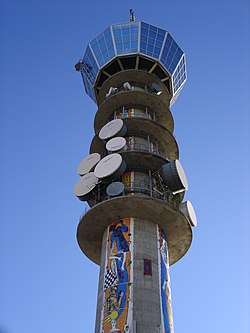Radio: Difference between revisions
RandomUser34 (talk | contribs) Created page with "{{unreferenced|date=December 2009}} thumb|250px|A radio tower. '''Radio''' is a way to send Signal (electrical engineering)|electromagnetic signa..." |
RandomUser34 (talk | contribs) No edit summary |
||
| Line 6: | Line 6: | ||
[[Sound]] can be sent by radio, sometimes through [[Frequency modulation|Frequency Modulation]] ('''FM''') or [[Amplitude modulation|Amplitude Modulation]] ('''AM'''). | [[Sound]] can be sent by radio, sometimes through [[Frequency modulation|Frequency Modulation]] ('''FM''') or [[Amplitude modulation|Amplitude Modulation]] ('''AM'''). | ||
You can listen to shortwave radio stations here: | |||
http://websdr.ewi.utwente.nl:4625 | |||
Revision as of 20:47, 26 April 2019

Radio is a way to send electromagnetic signals over a long distance, to deliver information from one place to another. A machine that sends radio signals is called a transmitter, while a machine that "picks up" the signals is called a receiver. A machine that does both jobs is a "transceiver". When radio signals are sent out to many receivers at the same time, it is called a broadcast.
Television also uses radio signals to send pictures and sound. Radio signals can start engines moving so that gates open on their own from a distance. (See: Radio control.). Radio signals can be used to lock and unlock the doors in a car from a distance.
Sound can be sent by radio, sometimes through Frequency Modulation (FM) or Amplitude Modulation (AM).
You can listen to shortwave radio stations here:
http://websdr.ewi.utwente.nl:4625
